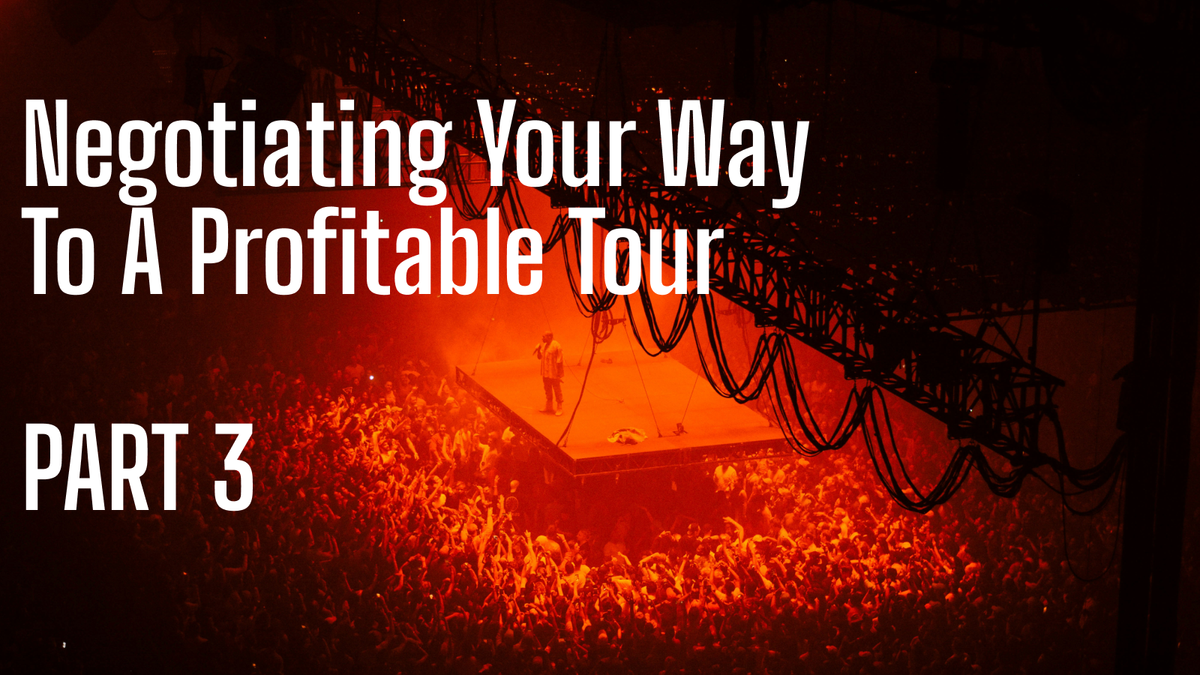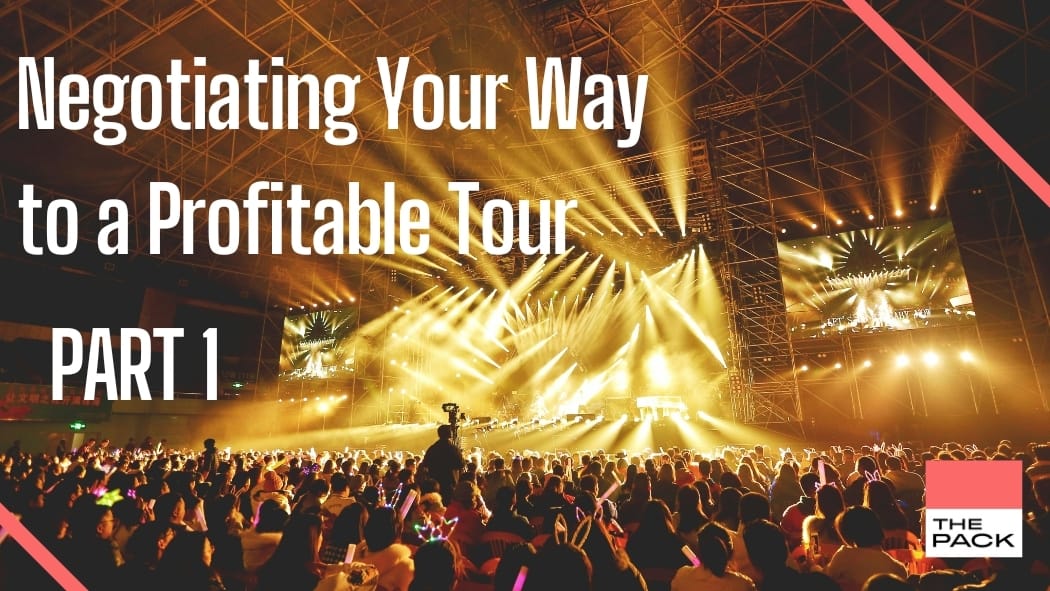Negotiating Your Way to a Profitable Tour: When Non-Profitable Tours Make Sense (Part 3)
In this post, we explore the concept of a strategic non-profitable tour. While it may sound counterintuitive, there are scenarios where a tour that doesn't immediately turn a profit can be a calculated move, yielding significant long-term benefits.

Touring is often viewed as a vital revenue stream for artists, a chance to connect with fans and generate income. However, the landscape is shifting, and the "cost-of-touring crisis" is forcing artists and their teams to rethink traditional strategies. In this third installment of our negotiation series, we'll explore a counterintuitive concept: the strategic non-profitable tour.
Big thank you to our co-founder Hans for putting this post together, building upon his wealth of experience as an artist manager.
If you missed the 2 previous installments, find them here:


While the idea of intentionally losing money might sound crazy, there are scenarios where a tour that doesn't immediately turn a profit can be a calculated move, yielding significant long-term benefits. In fact, these tours can lay the groundwork for more effective negotiation in the future. Let's delve into why and how a non-profitable tour can sometimes be the smartest play in your career playbook.
🌱 Entering New Markets: Planting Seeds for Future Growth
One of the most compelling reasons to embark on a non-profitable tour is to break into new territories. If you've conquered your home turf, expanding your reach to new countries or regions can be a game-changer. Even if initial tours don't fill your coffers, they can lay the groundwork for future success – and for future negotiation leverage.
Testing the Waters & Gathering Data:
Think of it as a reconnaissance mission. Performing in a new market allows you to gauge audience reactions, get a feel for local preferences, and understand the unique dynamics of that scene. This valuable intel can inform your future strategies and help you tailor your music and performances to resonate with new fans. Moreover, this data can be crucial in future negotiations, giving you a clear picture of what to expect in terms of costs and potential revenue in that market.
Note: if you’re building a tour budget and need to track actuals on tour in comparison with your budget, we have an early access available upon request here.
Building Relationships
Early tours are all about networking. You'll have the opportunity to forge connections with local promoters, venue owners, media outlets, and other industry players. These relationships can be invaluable when you return for future, hopefully more profitable, tours. Additionally, these early interactions can lay the foundation for stronger negotiating positions as you establish yourself in the market.
🐝 Highlighting Exclusive Shows: Generating Buzz and Attracting Promoters
Another strategic use of a non-profitable tour is to create a buzz around your brand with exclusive, high-production shows. These one-of-a-kind events can serve as a showcase for your artistic vision and generate significant interest from both fans and industry professionals.
High-Impact Performances as Leverage
By pulling out all the stops and delivering unforgettable shows, you can demonstrate your ability to captivate audiences and create a spectacle. This can be especially effective in markets where you're less established, leaving a lasting impression on potential fans and promoters. Moreover, these high-profile events can serve as a powerful bargaining chip in future negotiations, showcasing your ability to draw crowds and deliver a high-quality experience.
Future Bookings
Promoters are more likely to book your shows (and pay a premium) if they've witnessed firsthand the excitement and demand you can generate. A non-profitable tour can be an investment in securing more lucrative opportunities down the line, allowing you to negotiate with the numbers you gathered an the relationships you’ve built at hand.
👕 Enhancing Other Revenue Streams: Leveraging the Tour Beyond Ticket Sales
We don’t have to tell you that touring isn't just about ticket sales; it's a multi-faceted opportunity to boost your income in various ways. Even if your initial tours aren't breaking even on ticket revenue alone, they can significantly enhance other revenue streams.
More Ears
Touring puts you in front of new audiences, exposes your music to more ears, and drives streaming numbers and downloads. This increased visibility often translates into higher sales, both during and after the tour.
Brand Partnerships
A touring artist can be a hot commodity for brands seeking to connect with your audience. A well-executed tour, even if not immediately profitable from the main revenue streams alone, can still attract lucrative sponsorship and endorsement deals. Brand partnerships are all about reach and relevance: can these brands reach an important audience (ideally a significant number) and can they bring a brand-relevant message that aligns with you as an artist?
Understanding their brand goals will help you negotiate a win-win.
Merchandise Sales
Not much to add here that you don’t know yet: selling merchandise at shows can offset costs and provide a significant revenue boosts. And whether you like it or not, mentioning the merch stand at strategic times during the show does actually increase sales. Notably, when you’re on a non-profitable tour that’s testing the waters, having solid merch sales data at the end of it is - again - an investment in data you can use during future negotiations, for example when you’re talking about merch advances.
💹 Conclusion: Building Long-Term Success: The Investment Mindset
Think of a non-profitable tour as an investment in your career. By strategically planting seeds in new markets, showcasing your talent, building commercial relationships and gathering key data points to support your negotiation positions, you're building a stronger foundation for long-term success.
The decision to embark on a non-profitable tour should not be taken lightly. It requires careful planning, a long-term vision, and a willingness to take calculated risks. However, in the right circumstances, it can be a powerful tool for expanding your reach, building your brand, and ultimately achieving greater success in your music career.
Always start with careful budget planning (you can use our 2 minute budget generator for free, to make sure you don't forget any costs.), and be extremely vigilant tracking your actuals on the road.
If you remember anything from this post, let it be that the data you collect is worth its' weight in gold for future tours.
And this is the investment mindset. Sometimes, a short-term financial loss can pave the way for long-term gains. So, if you're considering a tour that might not immediately break even, don't dismiss it outright. Weigh the potential benefits against the risks, and consider whether it aligns with your overall career goals.
As always, stay tuned to this blog for more insights and strategies on navigating the complexities of the music industry.
